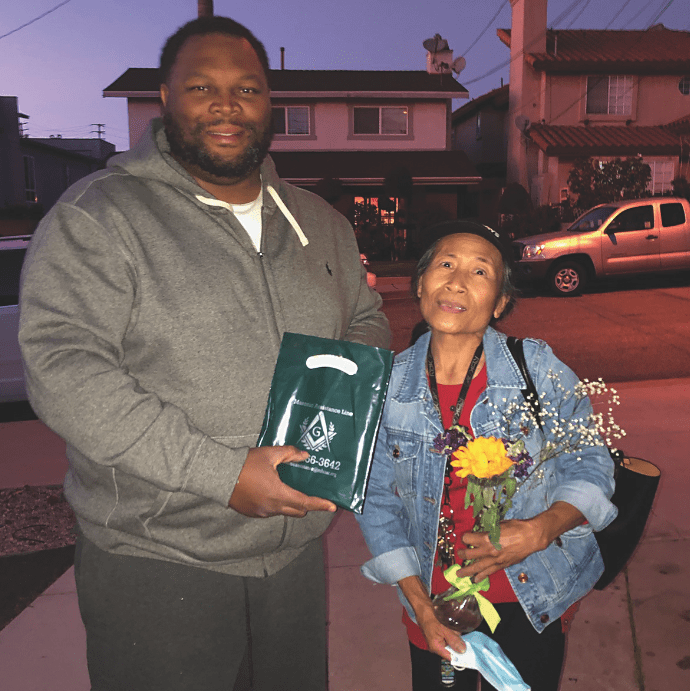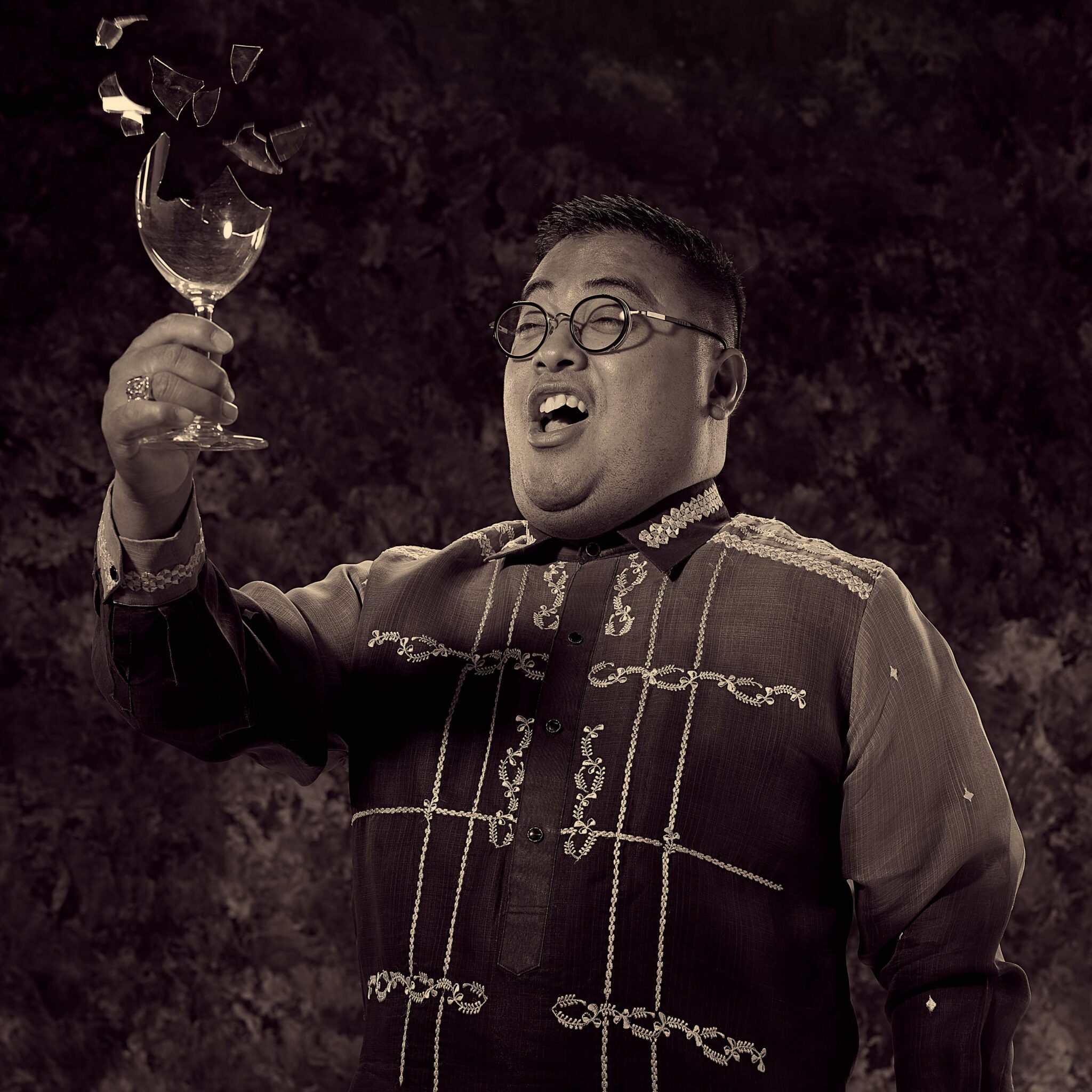
Outstanding in Outreach
How Beach Cities No. 753 made lodge outreach central to its entire mission.
When Marshall Goodman was 17, his mom gave him a pep talk. He was heading into his senior year at Woodrow Wilson High School in Long Beach. He had friends and loved to play drums, but there was also a “heavy energy” to him, his mother said, that made him seem wise beyond his years. “Marshall, I want you to know: You’re going to be a very important leader someday,” she told him.
Stirred by her words, Goodman decided to run for student body president. He won with a call-and-response campaign speech inspired by Martin Luther King Jr., Ralph Ellison’s Invisible Man, and The Autobiography of Malcolm X. And so for that final year of high school, the self-described introvert balanced his nascent political career with his true passion, music. The same year, Goodman joined a local ska-punk band making its name at backyard ragers around Long Beach. They called themselves Sublime. Within a few years, they’d be one of the biggest bands in the country.
More than 30 years later, it’s still hard to reconcile the earnest student-politician with the MC freestyling on Sublime’s early, rowdy demos. But talk to him long enough, and the contradiction of Marshall Goodman—better known in the music industry as Ras MG, and in the city of La Palma as Mayor Goodman—starts to make sense. That final year of high school, it turns out, was a fitting prelude. Even now, he happily refuses to pick a lane.
If Long Beach had an official anthem, it’s a good bet Marshall Goodman would have had a role in making it. As an early member of Sublime and a founding member of the Long Beach Dub Allstars, Goodman’s influence is all over the sound that emerged from the area in the early 1990s. The melding of reggae, ska, punk, hip-hop, and Latin music that characterized the region—evidenced by musicians as varied as War, Snoop Dogg, and Zack de la Rocha calling it home—unmistakably reflects the community’s diversity, and all these years later is still synonymous with the place itself.
Goodman moved to Long Beach at age 5 from Chicago, where his parents met in the 1960s. From a young age, he connected to the melting-pot nature of working-class Southern California. (Goodman’s mother is of Irish descent and his father is Black.) “My friends were Black, white, Cambodian, Vietnamese, Latino,” he says. “That’s Long Beach. It’s an international city. There’s so much culture and music and food that comes out of different types of people being together.”
A diverse blend of music found its way into his home, too. Goodman listened to Eric Clapton, Fleetwood Mac, Afrika Bambaataa, Run-DMC. He got into breakdancing. His mother sang in the church choir. His father, a gigging musician, introduced the kids to jazz and the blues, playing them bass lines on his electric guitar. Marshall’s older sister, Ruth, was an exceptionally talented saxophonist who played in bands throughout high school and went to UCLA on a jazz band scholarship.
It’s Ruth who Goodman names as his real musical mentor, and it was through her that he met the future frontman of Sublime, Bradley Nowell. Ruth was actually in a band with Nowell first, a ska outfit called Sloppy Seconds that rehearsed at the Goodman house. A few years Goodman’s senior, Nowell was barely out of high school and already known for his mischievous charisma. His lyrics tended toward the crass—a stark contrast to the serious-minded Goodman—but over time, the two bonded over deeper topics. “He was very sensitive, an extraordinary writer, a genius when it came to getting his thoughts down on paper,” Goodman says of Nowell. “A deep, deep thinker.”
Goodman was officially Sublime’s drummer for two years, 1990 to 1991, during which he enrolled in and dropped out of Cal State Long Beach. At that time, the band grew from being the town’s most popular backyard party band to headlining tours. Goodman has writing credits peppered throughout Sublime’s 1992 debut album, 40 oz. to Freedom, and later efforts including the George Gershwin-sampling radio hit “Doin’ Time.” But as the band took off, so did the drugs. “They were all heavy partiers,” Goodman says. “When it started interfering with the music and we couldn’t perform for people who had paid money to see us, that’s when I said, ‘I don’t think I want to be a part of this.’”
“The music was great, the brotherhood was great, but the partying—I just couldn’t buy into it.”
Their paths diverged from there. Still much in demand as a drummer, Goodman returned home and played with several outfits, from a reggae band to a steel drum orchestra to a group visiting from Africa that toured up to Stanford. He got married and had children. And for the next five years, he watched as Sublime blew up, in every sense of the term. Nowell died from a heroin overdose in 1996, at the peak of the band’s success, two months before their major-label debut, which would go on to sell more than 5 million copies in the U.S.. According to those close to him, Nowell’s overdose followed a year of sobriety. He left behind a wife and an infant son. “I never say I lost anybody,“ Goodman says. “When Bradley passed, the sadness was more like, ‘Damn it, he lost the battle.’ He was fighting this thing, he was winning, and then boom—he’s gone.”
In the wake of his passing, Goodman and a crew of former Sublime members and collaborators formed the supergroup the Long Beach Dub Allstars. “We had to keep moving forward with that energy,” Goodman says. “I think we did a lot of good by taking that music out there for people to hear.”
Musing on the forces that kept him from getting swept up in substance abuse, Goodman attributes his inner strength to his father. “I didn’t need drugs because I had the ability to be entertained by life,” he says. The elder Goodman died of pancreatic cancer in 1985, when Goodman was just 13. Or as Goodman says: He went on to glory. His son is still learning the lessons he left behind.
In 2009, nearly two decades after leaving Cal State Long Beach, Goodman decided to go back to school. Since 1997, he’d been a pivotal member of the Long Beach Dub Allstars, and he’d also been working as a songwriter, percussionist, and producer for other artists. He had four kids and coached their sports teams. He didn’t have a ton of time on his hands.
But he did have an insatiable intellectual appetite. He’d always been a voracious reader. The music industry had been good to him, but it never quite satisfied his curiosities about history, literature, religion, and mythology. So he went back and got his bachelor’s degree. He joined La Palma’s Community Activity and Beautification Committee as a way to help throw events in the community where he’d lived, at that point, for 15 years. Noting his natural leadership abilities, the other members nearly demanded he run for city council. He won, of course.
And then, in 2019, as City Councilmembers all do at some point in La Palma, he served a term as mayor. For the M.C. famously referred to as “well-qualified to represent the LBC,” it was a fitting title.
It was around that same time that Goodman began thinking about Freemasonry. He first became interested around 2013, but a negative experience with the first lodge he visited turned him off. Still, something pulled him toward it again, despite his apprehensions. “My mom was a born-again Christian, and I asked her, What do you think about Masonry?” he recalls. “Your father was a Mason,” she told him “I was an Eastern Star.” Goodman got goosebumps.
He decided to follow in his father’s footsteps. Goodman petitioned to join Lakewood Lodge No. 728 in 2015. “I saw Masonry as a place to fix the ills of the world. You have people coming together outside race, religion, politics, all these things that are separating us. I want to be a part of that.” He realized his father had raised him according to the tenets of Masonry without ever naming it aloud.
Chad Goyette was master of the lodge when Goodman first expressed interest, and he still remembers their first meeting. “We immediately made a connection—intellectually, emotionally, morally,” Goyette says, noting that membership was down at the time and they needed some fresh ideas. “He’s extremely intelligent, of course, and he’s brought such a unique perspective to the lodge. But the root of it all, for me, is his integrity.”
That rings true for others, as well. “I call Marshall when I’m going crazy,” says Chad Wanke, mayor pro tem of Placentia, a small community northeast of Disneyland. “Or I call when I need someone to give me a different perspective, or to just vent to.” On paper, Wanke and Goodman make an odd couple: Wanke is a Republican, Goodman a Democrat. They find themselves on different sides of the aisle all the time. But in 2016, the pair met at a political event, and Goodman noticed Wanke’s Masonic ring. The musician struck up a conversation.
They’ve been friends ever since, their conversations careening from questions of Masonic esoterica to their respective roles in city government. “He’s particularly helpful when I need someone I can trust who doesn’t agree with me, so I’m not in an echo chamber,” Wanke says. “Being a Mason and sharing the responsibility that comes with means we have this baseline. We can get together and have conversations about things we disagree on in a civil, brotherly way.”
In the summer of 2020, as protests following the murder of George Floyd spread across the country, the pair had long, tough conversations about how to respond to their constituents, and what it meant to keep people safe. “We talked about: Do you kneel with protestors? Do you have your police at protests right off the bat?” Wanke recalls. He largely attributes Placentia’s peaceful marches in 2020 to ideas he got out of their talks. “He’s made me a better mayor.”
On a recent Monday morning, Goodman is juggling a dozen roles, as usual. At 50, he’s now a grandfather twice over. His position as vice chair of the housing, community, and economic development policy committee for the League of California Cities means he can talk land use in his sleep.
Meanwhile, the Long Beach Dub Allstars have just released a record and begun playing live shows again. Goodman runs the band’s business, though these days he sometimes subs out of his drumming duties. His more important role in the group is as a mentor, ensuring the band remains a fertile ground for up-and-coming talent.
He also just completed a graduate degree in public administration and has begun thinking about teaching ethnic studies. “I love talking about the dichotomy in society between black and white,” he says. “It has impacted my family my entire life, and I have a lot to share. I think I can bridge gaps.”
Meanwhile, Sublime’s legacy only continues to grow: The 25th anniversary of their self-titled record brought with it a slew of coverage, while bands made up of former Sublime members and tribute bands continue to perform the group’s music to adoring crowds. (Goodman thinks Nowell would be amused at the nostalgia that attends the band today, but also touched. “He would’ve wanted to meet the people playing his music—to sit with them with no shoes on and talk about life. He was just a pure soul. And he’s loving it. I feel his energy all the time.”)
As for Goodman’s role in all of it, he’s grateful. He feels a responsibility to keep telling Sublime’s story. And he’s learned there’s no use trying to keep that part of his life separate from the others.
That became clear early on, when California State Assemblymember Sharon Quirk-Silva would make a point of highlighting Goodman’s musical bona fides at political events. “Every opportunity she got, she would bring it up,” he says with a laugh. “She would be like, ‘By the way, we have a member of Sublime here. Marshall Goodman, stand up.’ So at some point I told her, you can choose to not mention it, too.”
The lawmaker chastised him. “She said, ‘Marshall, this is who you are. You’re not going to do what you’re meant to do in life by being shy.‘
“And you know,” he says, “she was right.”
Goodman was elected to the La Palma City Council in 2016. A year prior, he was raised a Master Mason at Lakewood No. 728.
PHOTOGRAPHY CREDIT:
Mathew Scott

How Beach Cities No. 753 made lodge outreach central to its entire mission.

